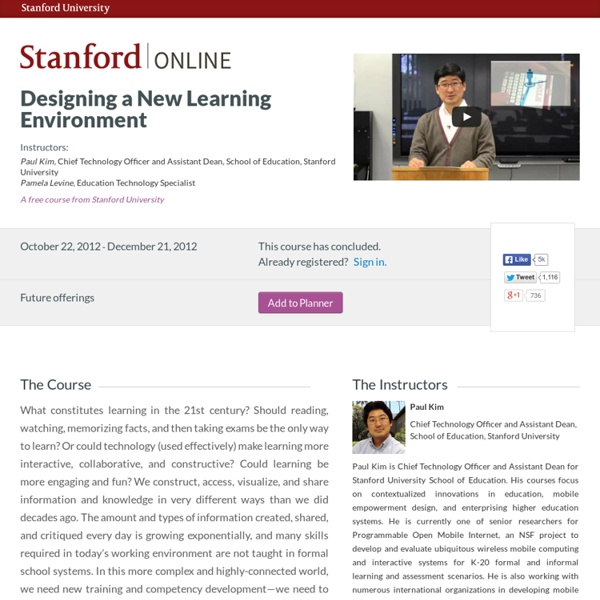Venture Lab: Learn, Collaborate, and Create!
What constitutes learning in the 21st century? Should reading, watching, memorizing facts, and then taking exams be the only way to learn? Or could technology (used effectively) make learning more interactive, collaborative, and constructive? Could learning be more engaging and fun? We construct, access, visualize, and share information and knowledge in very different ways than we did decades ago. Schedule The course runs from Oct 15 - Dec 20, 2012.Workload 4 hours a week.Technical Requirements You need a computer that allows you to watch the video lectures, and the ability to upload your assignments which will be digital artifacts such as powerpoint or video presentations.Statement of Accomplishment Subject to satisfactory performance and course completion, you will receive a statement of accomplishment signed by the instructor. « Less
Current/Future State of Higher Education - An Open Online Course
EdTech Cheat Sheet
Gamification, digital storytelling, virtual classrooms…it’s not easy to keep track of all of the new buzzwords in the booming edtech sector. At Boundless, we’re confronted with these terms and technologies every day, and we do our best to keep all of the lingo straight. We put together a little cheat sheet to help you master some of the most important words to know in edtech. Brush up on your terms to make sure you’re not scratching your head at the next conference, meetup or debate about the future of education!
TV des Entrepreneurs > Accueil
The Minerva Project
Khan Academy
Find Masters in Europe: all MBA, MSc., MA, LLM, MPhil and other postgraduate programmes - MastersPortal.eu - MastersPortal.eu
cours en e-marketing en libre accès
cours en marketing digital en libre accès Cours en marketing digital en libre accès <A HREF=" Amazon.fr</A> Voici quelques uns de mes cours en e-marketing (marketing digital) faits en 2012, 2013 et 2014 au CNAM. Le premier cours est un cours d'introduction sur la e-publicité et les tendances du marché : internetsupportpublicitaire.pdf Le deuxième cours parle de SEO et de SEM : le-seo-et-le-sem.pdf Le troisième cours traite du marché du Search : lemarchedusearch.pdf Le quatrième cours est un focus sur le display : display2011.pdf Nous avons également parlé d'e-mailing : l-e-mailing.pdf mais aussi d'achat sur Facebook ou Twitter : la-publicite-sur-facebook-et-twitter.pdf et de transmédia, crossmédia bref de communication 360 degrés : du-cross-media-au-trans-media.pdf ou de marketing à la performance : Blog
Related:
Related:




A great MOOC guiding you through the process of designing meaningul learning experiences taught by Paul Kim, Stanford's CIO. by reill110umn.edu Nov 1